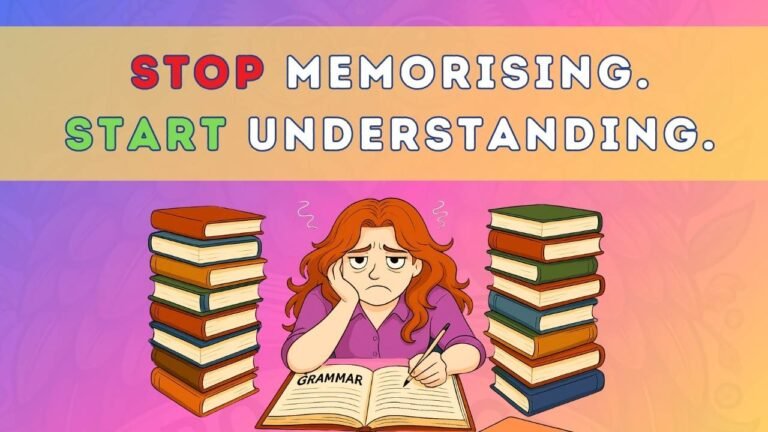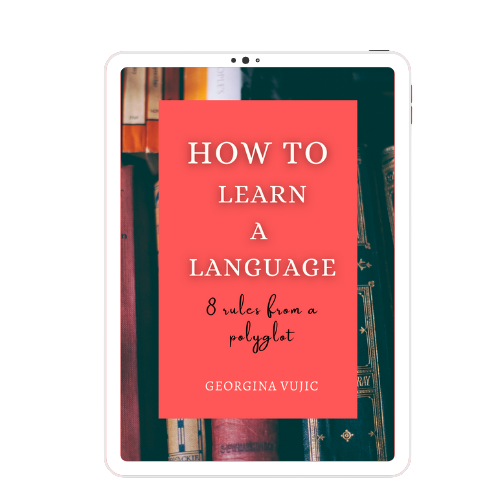Language learning is often described as a journey. A thrilling one, yes — but also one that demands focus, strategy, and most importantly, rest stops. One of the biggest roadblocks learners face isn’t lack of motivation or bad memory — it’s something far more silent: cognitive overload in language learning.
If you’ve ever sat through a grammar lesson and walked away feeling like you retained nothing… or binged five language videos in a row only to feel frustrated rather than fluent — you’ve likely experienced it.
So what exactly is cognitive overload, and how does it sabotage your progress without you even noticing? Let’s explore.
WHAT IS COGNITIVE OVERLOAD IN LANGUAGE LEARNING
Cognitive overload occurs when your working memory, which is the part of your brain responsible for holding and processing new information, is overwhelmed. It’s like pouring water into an already full glass. No matter how pure or high-quality the input is, if there’s no space left, it spills over and is lost.
The term comes from Cognitive Load Theory, a model from educational psychology. It explains how our working memory has limited space. Once we exceed that space, we can no longer learn effectively. We may still be reading, listening, or practicing—but the brain is too full to absorb or organize the input.
This is especially common in language learning, where students try to take in new grammar, vocabulary, pronunciation, and cultural context all at once. The result? Mental fatigue, confusion, and frustration.
SIGNS YOU’RE SUFFERING FROM COGNITIVE OVERLOAD
Recognizing cognitive overload in language learning early can prevent burnout and wasted time. But it’s not always obvious.
Many learners don’t know they’re overloaded, they simply think they’re bad at languages.
Common signs include:
- Feeling mentally exhausted after short study sessions
- Forgetting words you just learned moments ago
- Zoning out during lessons or conversations
- Struggling to follow audio or dialogue despite previous practice
- Feeling discouraged or unmotivated despite consistent effort
This isn’t laziness or lack of discipline — it’s your brain waving a red flag. It’s telling you that the input is too much, too fast, or not being processed effectively.
THE SCIENCE AND CAUSES BEHIND IT
Language learning heavily relies on working memory — a cognitive system responsible for temporarily holding information available for processing.
When you listen to a Spanish sentence like “Aunque tenía sueño, fue a la reunión”, your brain has to:
- Decode the meaning of each word
- Parse the grammar (imperfect tense, conjunctions)
- Assign the correct meaning based on context
- Remember the sentence long enough to make sense of it
- Store what you’ve learned for future use
That’s a lot, and when too many new elements are introduced simultaneously, your working memory can’t keep up. This results in cognitive overload.
Several things can lead to it, however. One of the most common is studying content that’s far above your level. For example, if you’re an A2 learner listening to fast native speech without support, your brain can’t filter or understand enough of what it’s hearing. Instead of learning, you’re just swimming in noise.
Another cause is trying to produce language (speaking or writing) without enough preparation. You might be asked to write a paragraph in the past tense before you’ve had a chance to review the forms or see examples. That pressure to perform too soon causes your brain to freeze.
Disorganized or overstimulating resources can also contribute. Watching grammar videos, scrolling flashcards, and reading subtitles at the same time might feel like productive multitasking. But in reality, it fragments your focus and overloads your short-term memory.
@romancelanguagecentre ✨ UN PELÍN DE ESPAÑOL ✨ Today’s Spanish expression: pasar la noche en blanco 💤 It means you didn’t sleep a wink — maybe from nerves, excitement, or too much coffee ☕😅 👉 Curious how we teach real Spanish through stories, culture, and context? Visit us at https://romancelanguagecentre.com/ — see how we teach students to learn to understand, not just memorise. #spanishgrammar #spanishpodcast #learnspanish #spanishtiktok #spanishlessonsonline ♬ original sound – romancelanguagecentre
@romancelanguagecentre ✨ UN PELÍN DE ESPAÑOL ✨ This week’s bit of real Spanish: sudar la gota gorda. It means to sweat buckets — or to work really hard for something. 📚 Example: “Sudé la gota gorda en el examen.” Now it’s your turn: When did you sudar la gota gorda? Finish it below: “Yo sudé la gota gorda cuando…” 👇 A little Spanish, every week — Learn to Understand. #spanishgrammar #spanishpodcast #learnspanish
♬ original sound – romancelanguagecentre – romancelanguagecentre
@romancelanguagecentre Adventure to Fluency Podcast | S1EP2 | Duende: The Secret Power of Art 🎨 ✨ Did you know duende isn’t just a mischievous goblin? In Spanish, it’s also the magical force behind great art and deep emotion! 👉 Catch the full podcast episode + grab the free transcript and worksheet here: https://romancelanguagecentre.com/spanish-podcast/ LearnSpanish ElDuende SpanishVocabulary SpanishCulture AdventureToFluency #spanishgrammar #spanishpodcast
♬ original sound – romancelanguagecentre – romancelanguagecentre
INPUT vs OUTPUT: THE BALANCE LANGUAGE LEARNERS OFTEN MISS
One of the most well-known theories in language education is Comprehensible Input, introduced by linguist Stephen Krashen. The idea is simple: we acquire language by hearing or reading content we mostly understand, with just a touch of challenge.
For example, if you’re an A2 (upper beginner) learner, listening to an A2-B1 podcast or reading a graded short story is optimal. It stretches your understanding just enough to build new neural pathways without overwhelming you.
But input isn’t everything.
Another powerful (and often overlooked) theory is Comprehensible Output, proposed by Merrill Swain. It argues that learners truly solidify their language when they try to use it — when they speak, write, and interact.
Why? Because when you try to express an idea and get stuck — say, you don’t know the right verb tense or can’t recall a word — your brain becomes more aware of its knowledge gaps. That awareness creates a cognitive space ready for growth.
However, just like input, output must be structured and supported. Throwing a beginner into free conversation without prep or scaffolding can quickly lead to — you guessed it — cognitive overload. structure. Notice how small changes affect the meaning. This deepens your sense of grammar as expression, not just correctness.
REAL-WORLD EXAMPLES OF COGNITIVE OVERLOAD IN LANGUAGE LEARNING
Let’s look at a few typical learning situations:
1. The Binge-Watcher
You watch six episodes of a Spanish Netflix series with subtitles off, hoping to “absorb” the language. After episode three, your brain’s full. You’re no longer following grammar patterns or catching new words — just watching visuals. Nothing sticks.
2. The Grammar Grinder
You try to master the subjunctive in one afternoon with three grammar videos and worksheets. It starts off okay, but by hour two, everything blurs. You keep writing the same sentence and can’t remember if it’s tenga or tuviera.
3. The Silent Student
You’ve listened to hundreds of hours of Spanish audio, but you still freeze when asked to respond. You haven’t practiced output. The moment you’re asked a question, you panic — you don’t know how to retrieve or build the language under pressure.
Each of these is a classic example of cognitive overload in language learning. And none of them indicate a lack of potential — only a need for smarter pacing and more effective methods.
HOW TO PREVENT COGNITIVE OVERLOAD
Avoiding overload is not about reducing the amount of time you spend learning — it’s about making that time count. Here are a few strategies:
1. Set Clear Objectives for Each Session
Instead of saying, “I’ll study Spanish for an hour,” set a goal like:
“I’ll learn and practice 3 reflexive verbs and use them in a sentence.”
This narrows focus and prevents you from jumping between unrelated concepts.
2. Use Graded Input That’s Just Above Your Level
Don’t jump into native-level news if you’re still at A2. Use content that challenges you without confusing you. Your brain needs to recognize about 80-90% of the material to learn from it effectively.
3. Balance Input and Output
Don’t just watch and read — write and speak. Start small. Summarize a short story. Say what you did yesterday. Use flashcards, but also use what’s on them in a real sentence.
4. Leave Space for Review and Reflection
After each lesson, take a few minutes to review what you learned. Write down what was clear and what was confusing. Reflecting helps cement knowledge and prepares your brain for next time.
5. Pay Attention to Mental Fatigue
Feeling foggy, frustrated, or forgetful? That’s your cue to pause. A short break, a change of activity, or stopping early can actually improve long-term retention.
THE ROLE OF GOOD TEACHING
When you’re working with a tutor or following a course, their job isn’t just to teach — it’s to gauge your readiness and prevent overload. A good tutor knows when to push and when to pull back.
For example, when introducing the past tenses, a thoughtful teacher might:
- First, use storytelling with visuals and familiar context
- Then, highlight patterns in sentences
- Follow that with guided written practice
- And finally, encourage spoken output — in a low-pressure, supportive context
This scaffolded approach avoids overwhelming your working memory and ensures you build each new skill on a strong foundation.
FLUENCY TAKES TIME – AND THAT’S A GOOD THING
In today’s fast-paced world, we’re conditioned to want quick results. But language learning doesn’t work that way. It’s not a checklist of grammar points — it’s a rewiring of your brain’s communication system.
Avoiding cognitive overload in language learning is about respecting that process. Trust your pace. Be kind to your brain. And remember: fluency isn’t built by cramming — it’s built by consistency, reflection, and supported output over time.
So next time you feel stuck or discouraged, ask yourself:
“Am I actually learning — or just flooding my brain?”
Chances are, you might just need to slow down and learn smarter — not harder.

















